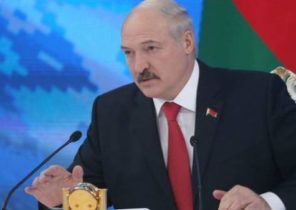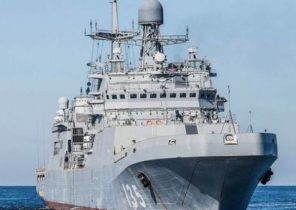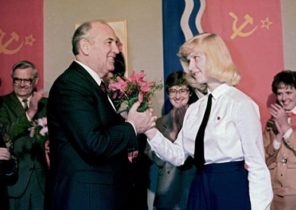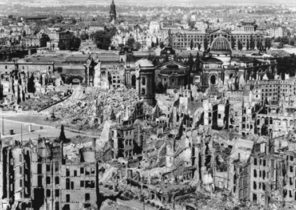
The US state Department published its latest report on the issue of trafficking in persons (human trafficking), and it revealed unexpected claims to Russia. The report States that on the territory of Russia are “labor camps,” which contained North Korean workers.
The very wording — “labor camps” — conjures a scary picture, forcing to remember about Kolyma in 1937. In addition, the us state Department report says that tens of thousand North Korean workers forced work for 20 hours a day for meager rations. The conclusion is quite clear: Russia, as well as a number of other countries where North Korean workers, uses forced labour and should immediately stop this malpractice.
The author of these lines is engaged in North Korea for more than three decades, and during that time I have had the privilege to talk to those DPRK citizens who have worked or are now working abroad. Including those from the camps fled and then moved to third countries. Therefore, after reviewing the report of the state Department, I can’t resist not to ask one simple question: what exactly are the workers in these camps, on what basis these alleged slaves of the XXI century are selected to be sent to “labor camps”?
The answer may surprise many. Formally to work in Russia, China and the middle East, the North Korean authorities send qualified workers who in addition are different ideological and political resistance. But in practice, the most important selection criterion has been the candidate’s ability to pay a bribe to local authorities, and we are talking about a very impressive, by North Korean standards, the amount.
I somehow have not heard that Africans in the seventeenth century slave traders paid for the right to Board the ship, uvozyaschego them to work on the sugar plantations of the Caribbean Islands. Did not come across stories about black slaves, returning after several years of work on the plantations had left a portion there so after a few years to re-pay for the right to go on Board the passing in America of the ship.
The mere fact that the opportunity to work in these “labor camps” in North Korea you have to pay a lot of money, shows that no matter how hard there working conditions, slave labor, this is considered not necessary.
For the vast majority of North Koreans working abroad means an opportunity to radically improve the property and social position and his own, and his family. Moreover, for many of them it is the only chance for social mobility.
The traditions of the loggers
The history of North Korean workers in Russia, the Soviet Union began even before the formal Declaration of the DPRK. The first group of workers were recruited to work in the fisheries and lumber camps of the Far East in 1946, when the Northern part of the Korean Peninsula was under direct control of the Soviet army. We are talking about very large-scale migration: during the period 1946-1949 years to work in the Soviet Union arrived 26 thousand people. Many of them at the expiration of the term of the contract tried not to go home. Some have succeeded — they happily joined in the Sakhalin Korean community.
But really, the history of labour migration began after 1966 at a closed meeting, Kim Il sung, and Brezhnev in Vladivostok, it was decided to regularly send in the USSR, North Korean workers. This project had survived the collapse of the Soviet Union, famine in North Korea, a frequent change of senior management and frequent changes of the political course of both countries. He continues to operate today.
This is not surprising: most of the projects of the Soviet-North Korean (and later Russian-North Korean) cooperation was economically malozamechennyj, carried out exclusively for political reasons and thus were not viable. But the supply of workforce is not the case: from the beginning it was economically justified and mutually beneficial project. He was won and the Russian-Soviet side treated with cheap and disciplined labor force, and North Korea, which could earn foreign currency, North Korean workers themselves.
In 1970-1990-ies the number of North Korean workers in each particular period in the Soviet Union ranged between 15 and 20 thousand people. Mostly they were employed in logging in Eastern Siberia and the far East.
Initially, reminded the North Koreans of the older generation, the idea of a trip to the Siberian taiga in winter special enthusiasm did not cause, and working really had to send back forcibly. But after a few years, the situation has changed radically: the people of the DPRK found that their neighbors, having worked in Siberia the required two years, returned to their homes in these rich — of course, by the modest standards of contemporary North Korea. The Koreans of the older generation still surprised I remember how the streets of their towns in the seventies, suddenly began to appear guys on their own motorcycles — IZH and “Java” were brought by their owners from the USSR.
Paid workers do very little in the early 1980s, the driver of a heavy truck or a logger earning 50-80 rubles a month, i.e. five times less than the same work would receive the citizen of the USSR. But the workers were provided housing and food, so the money is not particularly spent, and for two years — so he took then a typical business trip — lived on the desktop all ready accumulated a thousand other Soviet rubles.
The money to buy the goods that were in demand in the DPRK — from refrigerators and cars (in those days, symbols of extreme luxury, the analogue of a Porsche and a private jet) to TVs, enameled cans and pots. It was all loaded into containers and sent home for resale, so two years in Siberia guarantee 5-8 years of calm and well-fed life for the whole family. Of course, by “full life” means the ability almost every day there is rice, and occasionally pork, but in North Korea the seventies this was not all.
Of course, for the right to be selected you had to pay and then: the standard remuneration of the chief, who recommended you to work in the USSR, served as a TV — first black-and-white, and then, from about 1980-1985, increasingly in color.
Of course, the particular idyllic to consider the lives of workers was not necessary. North Korean camp of lumberjacks from the beginning, was a state within a state, and there were present representatives of the North Korean intelligence services closely monitored the moods and behaviour of workers. For deviations from the prescribed rules of conduct loggers face severe punishment. Possible culprits and suspicious exported from the Soviet Union to their homeland and dealt with them already there, and for their temporary detention in the largest camps of the North Korean loggers were equipped prison. In those cases, when removal was difficult, and the person seemed really dangerous, the North Korean competent authorities, without much hesitation, resorted to physical liquidation by the Soviet authorities reported that the man was the victim of an accident or even missing.
However, this happened rarely. The majority of North Korean workers were not inclined to discuss the messages “the revisionist Soviet press” and generally chatting about politics, and laws in General, they tried not to break. Their main objective was simple and clear — to earn money for the family, and with the money safely back home. Important role played the fact that from the very beginning, to work abroad was sent only to those who have stay at home wives and children, they have someone to come back, and in the case of undesired behavior of a worker in the authorities are the hostages.
On the situation of North Korean workers rebuild the affected surprisingly little. The need for cheap labor will not go away. Although in the crisis of the nineties the number of North Korean workers declined after 2000, their number again began to grow and now reaches about 30 thousand people.
However, the nature of work has changed: now the loggers are only a small part of all North Korean workers. DPRK citizens work in construction, agriculture, food and light industry, the service sector.
Dues easy replaced
North Korean authorities seek tighter control of their citizens abroad, so usually sow them densely in the hostels, or if they work in rural areas, in the notorious camps. But a significant number of North Korean workers in Russia from the end 1990-ies was “released for the dues.” They are allowed not only to move freely within Russian territory, but also to look for a job.
The implication is that they will give the state some fixed amount, as all earnings in excess of the keep. In most cases this right of the free search are the small brigade of an agricultural or construction workers small private orders. In many cases, additional extracurricular work on the side looking for those who work in organized groups in large enterprises and construction sites.
The size of “rents” is fixed and depends on a number of factors, including the qualifications of workers, the conditions of the area where it is located (for example, payments on Sakhalin, with its oil and gas wealth, is usually higher than on the mainland). In Russia in most cases, payments, formally referred to as the “scheduled fee” is now $ 500 to $ 900 per month.
Some of this money is in the pockets of North Korean managers and special service which nourished workers, but mostly they still do in the North Korean state budget. These income components in the amount of several hundred million dollars a year, and are the main reason that the DPRK is actively sending workers abroad, and the US state Department is trying to stop this practice.
However, vnaklade not remain and the ones whom the us state Department report called “slaves”. Usual for Russia is the situation when a worker, after making required payments and paying for living expenses, food and housing, can lay 150-300 dollars a month. To understand the value of this sum, we must bear in mind that the average salary of men working in the DPRK is now 50-70 dollars a month, and still need to feed my family. If you consider that most of the workers located on the territory of Russia within two to three years, it is quite possible to return home from 4000-6000 dollars.
The sum of this, by North Korean standards, very impressive, and until recently was generally huge. In most cases, the worker uses the money to buy his wife a retail outlet the minimum price which Pyongyang is now about five thousand dollars (provincial standard outlet, or 75 cm the counter market is significantly less). If the situation is favorable, then the money can open to something more serious — for example, a dining room or a sewing workshop.
This money can be used differently — for example, to spend on children’s education, paying for classes with Tutors and increasing their chances to get into a good University. Finally, they can spend on housing. Of course, in recent years, property prices in major North Korean cities have grown enormously, and five thousand dollars now is not enough even for a shack on the far outskirts of the capital, but in rural areas, for the money it is still possible to solve the housing problem.
Instead of pensions and scholarships
It is clear that just like to go abroad impossible. Gone are the Patriarchal times, when the Soviet television presented to the Secretary of the party Bureau after a trip to Khabarovsk Krai, was perceived as an adequate expression of gratitude. Now in the course of the universal equivalent — the us dollar and its counterpart, the Chinese yuan.
The standard bribe for the right to go to work in Russia is 500-700 dollars. This, incidentally, is much more than a bribe for travel to other countries, which also take the North Korean workers to travel to China enough to pay $ 200, the right to “slave labor” in one of the countries of the Middle East wants will cost 400-500 dollars.
Among North Korean workers Russia is a country with very good salaries and good living conditions. The attractiveness it contributes to the freedom that Russia’s use of North Korean workers in China, for example, they are almost prohibited from the territory of enterprises. It is clear that for the right to work in Russia, many people in North Korea willing to pay.
After returning from abroad, workers are intensive ideological training, which should neutralize the harmful knowledge about the world, which inevitably gets into their heads. Then for about a year they are supposed to work at the previous place of work — and then they can again be selected to travel abroad. The vast majority dreams about such option, the more that left from a previous trip money facilitate communication with superiors and the competent authorities.
However, even a modest point, which runs the wife successfully go abroad North Koreans, brings his family an income substantially above the average, so that one trip is enough to ensure a family of modest wealth.
This is important because in North Korea, ended the period of “storm and stress”, when, on the one hand, you could quite possible to die of hunger, and with another — even in the absence of a special relationship to gnaw their way into the “top 3%”. Now even the smallest business can not start without start-up capital, and the majority of the population of this capital no. Therefore, for the average North Korean, without special connections and education, but with skillful hands and willing to work a lot (and if required, 20 hours, here the state Department is right), several years of work abroad is almost the only chance to climb a couple of rungs on the social ladder, to guarantee the family the relative stability of property, to educate children and buy antibiotics sick parents.
It is not necessary to create illusions: the conditions in which employ North Korean workers, is extremely difficult, but they are usually still much easier than those in which they would have to work at home, and for less money. There is no doubt that the working day continues, “as long as necessary”, and the attitude to safety is very irresponsible. Only it’s not that evil North Korean secret services and force workers to work for free for two shifts — workers do it themselves, because they paid for it as much as they could never earn at home.
Yes, North Korean intelligence agencies carefully monitor the behavior of workers, and any manifestations of dissent punished them very severely. But dissent, and shoots among the workers is surprisingly small. On the one hand, workers know that if they run or suffer remaining the home of the family. In our liberal times the wife and children of the fugitive is no longer sent to the camps, but about any good work and the right to live in a big city they dream no more. On the other — the majority of workers, including those who are not too well disposed to the existing DPRK regime, go abroad to earn money to solve my family’s problems, and do not want to put the main objective at risk.
Purpose and phrases
But now, as we can see, they found defenders in the state Department and among Western liberals who want to ban North Korean labor migration.
With the US position is clear: the administration trump made a bid for economic pressure on North Korea. The expectation is that Pyongyang, faced with international sanctions and a deteriorating economic situation, decided to abandon nuclear weapons. This calculation, of course, wrong: nuclear weapons, the DPRK leadership will not refuse under any circumstances even if the preservation of the nuclear programme would mean a new hunger and the death of a significant part of the population.
However, Washington retained for this reason a lot of illusion, and now American diplomacy has been consistently working in order to close all channels of financing of the North Korean regime, including the supply of labour, which are a significant source of foreign exchange earnings in Pyongyang.
Then, as they say, the Americans are “in the right”: they have, like other countries, including Russia, there is every reason to fear, and most of the nuclear programs of North Korea and the negative impact that this program has on the stability of the nonproliferation regime. Of course, for experts it is obvious that sanctions will not lead to the desired result, but the fact that their introduction is clear and does not give rise to any fundamental objections.
Controversial the other attempts to present the efforts aimed at the financial strangulation of North Korea, in the form of concern about the rights of the North Korean population. The cessation of labor migration does not mean that North Korean workers will return home and will be there to work in air conditioned shops for 8 hours a day in compliance with all safety regulations. No, the terms work at home will have them, most likely, far worse than those they faced in Russia, but wages will be lower many times. Their children will not be able to receive a quality education, their parents will die prematurely without imported drugs, and their families instead of rice and sometimes fried pork will eat hateful boiled corn.
Of course, States are not required to care about the welfare of the country, on the streets where from time to time posters appear to be optimistic showing the burning of Washington. But it would be much better if the act of economic confrontation is not supplied in the packaging of high moral rhetoric. However, it is clear that hope is not necessary: such rhetorical packaging used by large and small countries to promote their own interests since time immemorial.







